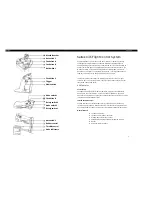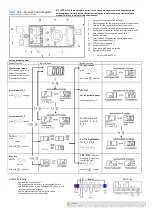
2
dc1245afa
DEMO MANUAL DC1245A
qUick stArt proceDUre
Demonstration circuit 1245A is an easy way to evaluate
the performance of the LTM4616. Please refer to Figure 1
for proper measurement equipment setup and follow the
procedure below:
1. Place jumpers in the following positions for a typical
1.8V
OUT
and 1.2V
OUT
application:
PHMODE2
MARGINING2
RUN2
MARGINING1
2PH
NO
ON
NO
TRACK1
PHMODE1
MODE
RUN1
DISABLED
2PH
BURST
ON
2. With power off, connect the input power supply, load
and meters as shown in Figure 1. Preset the load to 0A
and V
IN
supply within the 2.7V to 5.5V operating range.
3. Turn on the power at the input. The output voltage at
VO1
+
and VO1
–
should be 1.8V ±2% and the voltage
at VO2
+
and VO2
–
should be 1.2V ±2%.
4. Once the proper output voltage is established, adjust
the load within the operating range and observe the
output voltage regulation, ripple voltage, efficiency and
other parameters. To measure input and output ripple,
please refer to Figure 2 for proper setup.
5. To synchronize channel 1 to an external clock, please
apply the desired clock signal to CLKIN and SGND1.
The external clock signal should have amplitude of at
least 2V but less than V
IN
.
6. V
OUT1
can track another supply connected at TP20 as
determined by resistors R6 and R17. V
OUT2
is set up
to track V
OUT1
in a manner determined by resistors
R15 and R16. By default both resistor pairs have been
selected to support coincident tracking. Please refer to
Figure 6 for reference.
Figure 1. Test Setup of DC1245A
Figure 2. Proper Scope Probe Placement
for Measuring Input or Output Ripple
Figure 3. Measured Overall Supply Efficiency with Different V
IN
Overall Efficiency vs Load Current
INPUT OR OUTPUT CAPACITOR
LOAD CURRENT FOR EACH CHANNEL (A)
0
EFFICIENCY (%)
95
85
75
65
55
45
90
80
70
60
50
40
35
6
2
dc1245a F03
10
4
8
V
IN
= 3.3V, V
O1
= 1.8V, V
O2
= 1.2V
V
IN
= 5V, V
O1
= 1.8V, V
O2
= 1.2V
Downloaded from
Downloaded from
























